Migrant Workers and Racism
Listening carefully to the sacrifices
of overseas Filipino migrant workers
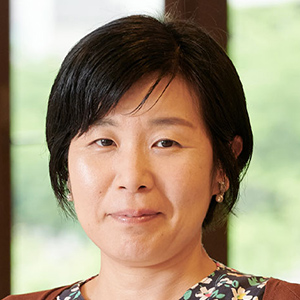
TSUJIMOTO ToshikoAssociate Professor,
College of International Relations
Learning the magnitude of sacrifices made by
Filipino migrant workers through dialogue
So, you are studying Filipino migrant workers?
TsujimotoWhat do you think when you hear "migrant workers"? For example, some people may be interested in the number of migrant workers from a country or the amount of money transferred to their home country. Some people may be interested in what the working environment looks like, and others may be concerned that the jobs of the workers in the destination are being taken away. I think there are various views.
I have been studying migrant workers from the Philippines to South Korea and other emerging Asian countries. This is research based on qualitative surveys. Unlike a large-scale questionnaire, qualitative surveys are conducted by interviewing specific people or organizations to understand events, people's attitudes, and complex emotions that cannot be expressed numerically . The first one was a research project I participated in before studying in South Korea. I had deep conversations with Filipino migrant workers who gather every weekend at a local Catholic church, building long-term relationships with them, and got to know how they live and think.
They come overseas with various lives to support their lives. Many are forced to migrate away from their families, and in talking with them, it became clear how much they are sacrificing through migrant labor, such as their relationships with their children. It was something that I never saw when I discussed the number of migrant workers and how much money they remitted from a national perspective. It was particularly striking when young workers married each other and had children at the destination. Since the parents do not have residency status, the children are not allowed to stay legally and must be sent back to their home country within a certain period of time. I also heard stories of Filipino priests and others with stable residency status who returned home temporarily and migrants’ babies were brought back with blankets that had their mother's scent on them.
My research has been criticized for being like reportage. And to that, some say “so what?” However, I believe it is important to listen to these micro-level stories and the subtleties of people's emotions, connect them to the theories and arguments established by past research, and properly incorporate them into academia.
I want to make theory on the unequal treatment
of migrant workers as a new form of racism.
What do you feel through your research?
TsujimotoEven if you move from Kyoto to Tokyo, there are many things you have to reconcile in life, such as your home, your children's school, and caring for your aging parents. Migrant workers cross borders, so there's a lot more to come to terms with. I keep thinking that there is an overwhelming inequality between those who have no other options for survival but to come to terms with their lives and do migrant labor at their own risk, and nationals who can work in their own countries and just live with their families and enjoy the benefits of the labor of migrant workers. In international relations, especially when considered at the individual level, we should not overlook the challenges not only in the area of labor, but also in the area of individual reproduction that follows a person throughout his or her life, such as family formation and care.
Migrant workers are now an integral part of the care of the elderly in developed countries. I think we also need to think carefully about how to understand the current situation in which care for the elderly is achieved at their expense.
There are also issues of extramarital affairs and familial breakdown associated with migrant workers living away from their families in foreign countries. Many Filipinos are Catholic, and divorce is, strictly speaking, illegal in the country. . Nevertheless, in my research I have come to understand that it is very human to seek intimacy, sometimes out of feelings such as loneliness, while doing migrant labor away from one's family. It may not be common sense, but it is an issue that must be considered within the context of the lives of migrant workers. One of the major issues in my research is how to view these private issues as academic and social issues. I am finding it difficult and at the same time interesting as a researcher.
In the future, I am interested in theorizing the unequal legal and social treatment of migrant workers as the new racism. This type of research has been conducted gradually, especially in Europe and the U.S., but I would like to address how it can be explained in the Asian context.
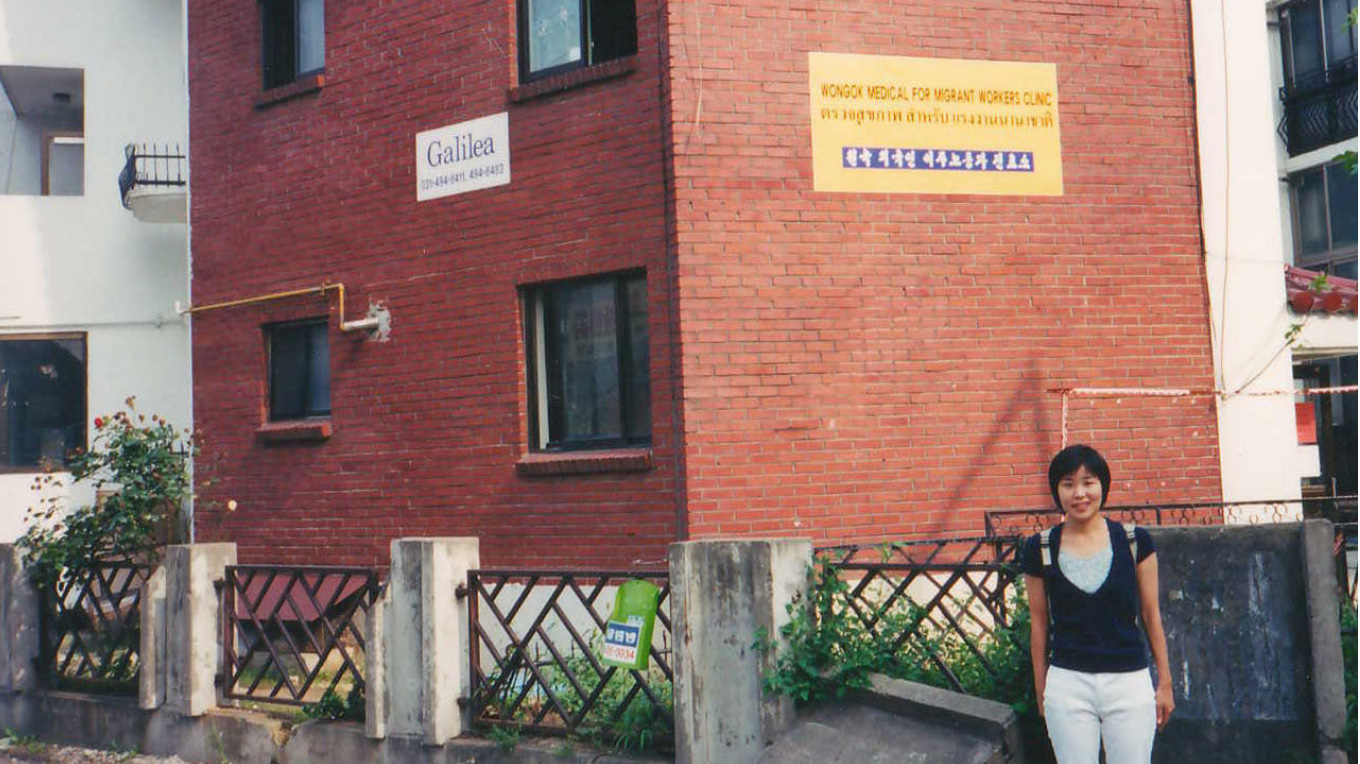
NGO which provides medical assistance for migrant workers on the outskirts of Seoul.
There is never a “correct answer” in classes
taken by students from various countries
Why did you start studying Filipinos?
TsujimotoMy first interaction with the Philippines was on a high school students’ study tour organized by a civic organization. At that time, the Philippines was perceived to be a dangerous country, partly due to the kidnapping of the branch manager of a Japanese trading company, but when I actually went there, I found that people were very cheerful and friendly. I felt it was a very interesting country. After that, I majored in Filipino language at Osaka University of Foreign Studies and went on exchange to the University of the Philippines, where I became more familiar with people's daily lives and social problems.
At that time, overseas migrant labor was already a major national issue in the Philippines. In a situation where most of the population is involved in some form of overseas migrant labor, I was asked to participate in a research project on Filipino migrant workers. That is the origin of my research. I entered the world of academia not from a big theory, but from the perspective of countries and societies that have not received much attention in orthodox international relations.
What is your impression of the College of International Relations and its students?
TsujimotoThe College of International Relations has many foreign students from various countries, so it has a different atmosphere from general Japanese universities. In class, there are many interactive engagements with students, and I often think together and consider issues with them. Race and Ethnicity in the Modern World, for example, is a class that I myself am very nervous and excited about. This is because students from many different countries are taking the course, so there can never be a "correct answer," and students criticize what is written in the textbook. I find many of the classes to be very exciting, based on the premise that there are many different ways of looking at things.
For Those Interested in
Migrant Workers and Racism: BOOKS
駒井洋監修・小林真生 編著
変容する移民コミュニティ:時間・空間・階層
明石書店(2020)
日本における移民コミュニティの定着過程や変容を、時代ごとに追って紹介している。多様な国や文化背景をもつ移民が、いつ・なぜ・どのように日本社会へ定着したのか、包括的に知ることができる。
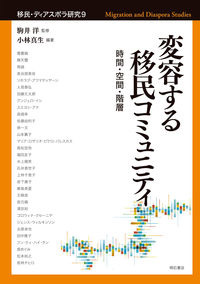
白石奈津子
出稼ぎ国家フィリピンと残された家族:不在がもたらす民族の共生
風響社(2018)
家族を移民として海外へ送り出しているフィリピン現地の人びとの日常の暮らしを、フィールドワークによって丁寧に描き出している。コンパクトなブックレットにまとめられており、とても読みやすい。
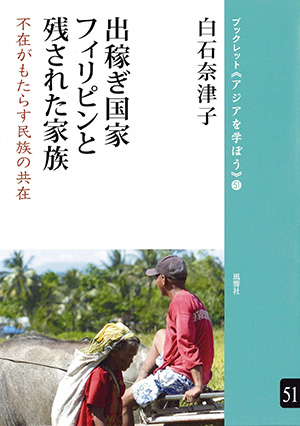
Rhacel Salazar Parreñas
Servants of Globalization: Migration and Domestic Work (Second Edition)
Stanford University Press. (2015)
幼い子どもをフィリピンに置いて海外で家事労働者として働くフィリピン人移民女性労働者の心理的葛藤や日々の労働を、丹念な質的調査方法と膨大なインタビューにより明らかにしている。
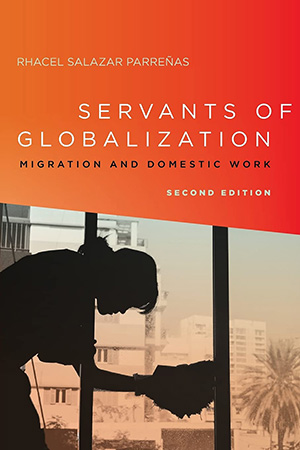
For Those Interested in
Migrant Workers and Racism: FILMS
映画
マンモス:世界最大のSNSを創った男
2009年、スウェーデン、ルーカス・ムーディソン監督
ニューヨークの裕福な家庭で家事労働者として働くフィリピン人女性と、かの女がフィリピンに残してきた家族が同時進行で描かれ、家族を軸に世界の不平等が先鋭に描き出されている。
映画
イロイロ:ぬくもりの記憶
2013年、シンガポール、アンソニー・チェン監督
シンガポール人の家庭で働くフィリピン人家事労働者と、かの女が面倒をみる雇用主の息子との人間的な交流が描かれている。女性移民家事労働者が家庭という親密な空間において、いかに大きな存在となっているのかを実感させるものとなっている。